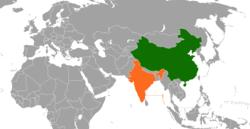India’s diplomatic victory : China Suspends Projects In Sri Lanka For a long time, China has pursued a strategy of converting small countries into colonies in the name of infrastructure projects .As part of this strategy, it has also encircled India’s neighbour. China has invested more than $150 billion in the economies of Bangladesh, the Maldives, Myanmar, Pakistan, Nepal, and Sri Lanka , over the last decade . China is now the largest foreign investor in the Maldives, Myanmar, Pakistan, and Sri Lanka Furthermore, China intended to build a hybrid energy system project on three Sri Lankan islands near India, which India objected . In January 2021, the Chinese company , Sino Sore Hybrid Technology , was awarded the contract to design a hybrid renewable energy system for , Nagadeepa, Delft, and Analthivu islands. The three Sri Lankan islands off the coast of Jaffna are strategically close to Tamil Nadu The contract was part of the Supporting Electricity Supply Reliability Improvement Project, which is implemented by the Ceylon Electricity Board (CEB) and funded by the Asian Development Bank (ADB) The Sri Lankan government’s announcements clearly shocked India. And As a result, India lodged a “strong protest with Sri Lanka on the award of the tender to the Chinese company India’s diplomatic victory The strategic importance of Sri Lanka’s three northern islands stems from their location. In terms of security, these islands are extremely important to India. As a result of China’s attempt to infiltrate the energy project here, India’s ears were raised. And for nearly a year India has been working to remove China from these three Sri Lankan islands New Delhi lodged objections against these projects on two grounds and approached the The Sri Lankan government and offered to build the same systems at a much lower cost. India detailed how China’s project would face environmental scrutiny because diesel was also a component of this hybrid project, and offered to make it more environmentally friendly. Another reason was that the Chinese company that was awarded the contract was only private in name. In reality, the Chinese government controls it entirely. India also offered Sri Lanka grants to cover a significant portion of the project’s cost. Only a small portion will be provided in the form of a loan, and that on favorable terms. It was a difficult offer to turn down for Sri Lanka.The Sri Lankan government initially welcomed India’s offer, but later remained silent
2021-12-09

